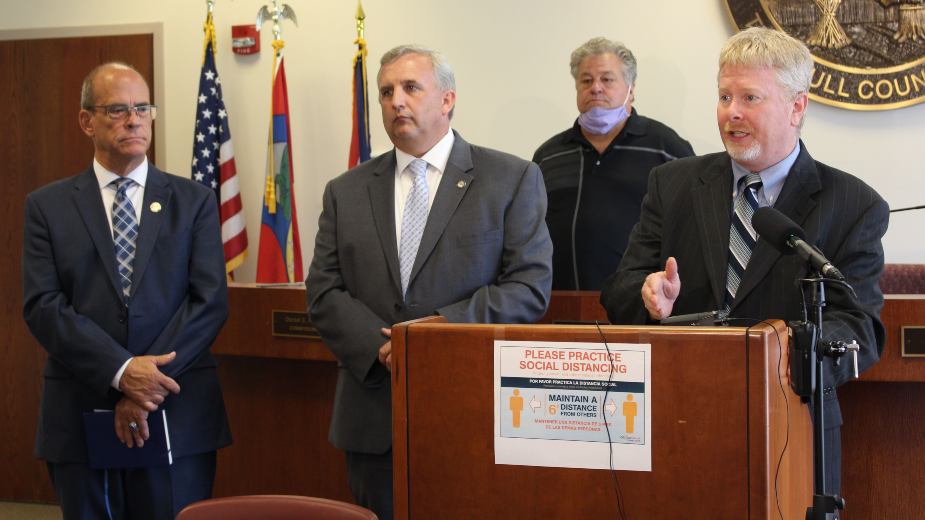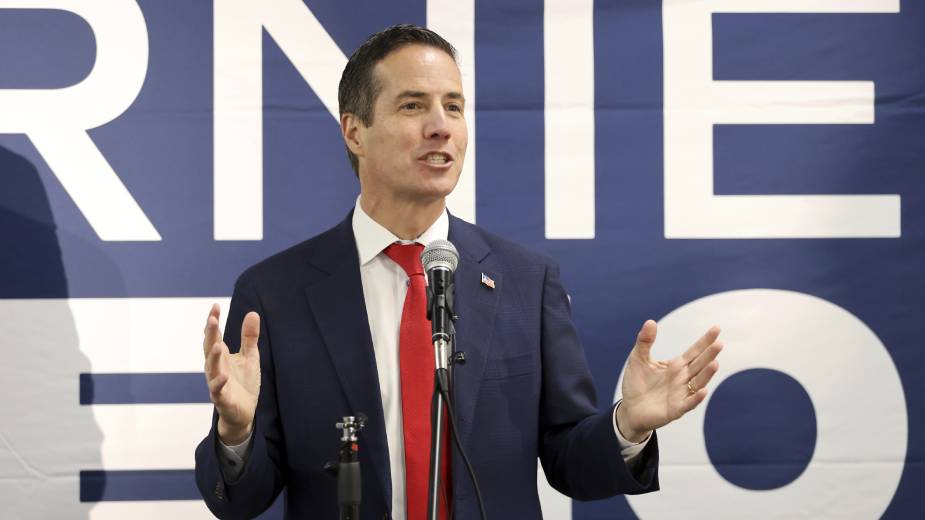Dems Eye Campaign Finance Reform After H.B. 6 Repeal Effort
WARREN, Ohio – Democratic state lawmakers have their sights on campaign finance reform once they are successful – as they expect to be – in repealing legislation at the center of a scandal that led to the arrest Tuesday of Ohio House Speaker Larry Householder.
State Sen. Sean O’Brien and state Reps. Mike O’Brien and Gil Blair said Wednesday that they would be introducing legislation in their respective chambers of the Ohio General Assembly to repeal House Bill 6, legislation passed last year that adds a surcharge on electric customers’ bills to subsidize two nuclear plants in the state.
The bill is at the center of the criminal complaint filed by the FBI against Householder, who is accused of heading Generation Now, a 501(c)(4), social welfare group that received $60 million from an unidentified company – believed to be FirstEnergy Corp. – to pass a ratepayer-funded $1 billion bailout of the two nuclear power plants in Ohio, as well as block attempts to overturn the bill.
Until “real” campaign finance reform is enacted, such scenarios can pop up again, said state Sen. O’Brien, D-32 Bazetta, during a news conference held Wednesday in the meeting room of the Trumbull County Board of Commissioners.
“The tip of the iceberg is House Bill 6 because that is the end result of what happened. The fundamental problem underneath that tip is campaign finance,” he said.
Federal agents Tuesday arrested Householder — who is serving in his second stint as House speaker — and four associates, in what U.S. Attorney David DeVillers described as “likely the largest bribery scheme ever perpetrated against the state of Ohio.”
Former Ohio GOP Chairman Matt Borges, longtime Householder adviser Jeff Longstreth, and lobbyists Neil Clark and Juan Cespedes also were arrested.
Most of the people Sean O’Brien said he talked to Tuesday, when the state Senate was in session, had “no idea this was coming,” though there had always been talk about the massive amount of support by FirstEnergy for Householder and other Republicans in the Ohio House of Representatives and how the money was used.
The “sheer numbers” attached to the payments from the utility to Generation Now discussed Tuesday were “shocking to all those that witnessed the news conference,” said state Rep. O’Brien, D-64 Warren. Money in the fund was used not only to get the legislation passed but also to block a ballot initiative to repeal it.
The House energy generation committee, which O’Brien co-chaired, heard 250 witnesses during five days of testimony on H.B. 6. Of those witnesses, two-thirds were in opposition to the legislation.
“It is clear that House Bill 6 must be immediately repealed,” the state senator said. Without the “immediate repeal” of the bill, “public confidence cannot be restored and those engaged in these enterprises will continue these illegal activities,” he added.
H.B. 6 was “vehemently opposed” by the natural gas power industry, said Blair, D-63 Weathersfield Township. Its passage at least delayed the development of a second gas-fueled power plant in Lordstown and prompted plant developer Clean Energy Future, Boston, to call off plans for a third plant.
When he and O’Brien opposed a resolution in the energy and natural resources committee that would have disrupted financing by foreign banks of power companies, Householder backed opponents to their reelection, Blair said.
“Even out to this week, they have been touting that they are Householder candidates,” he said.
The legislation the state lawmakers said they planned to introduce Wednesday would repeal H.B. 6 in its entirety and “essentially make it that House Bill 6 never existed,” Michael. O’Brien said.
The legislation narrowly passed both houses before being signed into law by Gov. Mike DeWine. Of the state lawmakers who represent the Mahoning Valley, only the late state Rep. Don Manning, R-59 New Middletown, voted in support of it.
As co-chairman of the House committee overseeing the legislation, O’Brien said he spoke with Manning about the bill. “He told me from the beginning that he was in favor of it,” he said.
The only way to rebuild public confidence is to “rebuild” what the state senator called a “bad bill,” but the situation also underscored the “underlying problem” with Ohio’s campaign finance laws.
“Until we have real campaign finance reform, things like this can pop up again,” he said. Discussions are in the early stages with Republicans on potential reforms, he reported.
Both O’Briens said their legislation predicted the repeal legislation would have bipartisan support. In the Senate, state Sen. Stephanie Kunze, R-16 Hilliard, has agreed to co-sponsor Sean O’Brien’s bill, he said.
He also said he has spoken with state Sen. Michael Rulli, R-33 Salem, who is looking at the proposal.
Rulli could not be reached for comment Wednesday.
The House version, which Michael O’Brien is serving as lead sponsor for, also will have Republican support as well as co-sponsorship by the entire Democratic caucus, the Warren Democrat said.
Republicans recognize repeal of the bill isn’t a partisan issue. “It’s a right-and-wrong issue, and when it’s that way it makes it easier,” Sean O’Brien said.
If it passes both houses, the repeal legislation would go to DeWine for his signature or veto.
DeWine was the first to call on Householder to step down following his arrest, Michael O’Brien said. If the repeal legislation has overwhelming support in both houses, the governor “has an obligation,” he said.
DeWine appeared to throw cold water on the state representative’s optimism Wednesday afternoon. During his coronavirus briefing, he and Lt. Gov. Jon Husted stood by the bill.
“For a long time, I’ve advocated and the lieutenant governor’s advocated for a balanced energy policy in the state of Ohio,” DeWine said. “We think having nuclear plants is a part of that balanced policy.”
Among the reasons why DeWine supported and continues to support the bill is the number of workers employed at the plants. Additionally, losing the two nuclear plants – which he believes would have happened without the bill – would have meant having “virtually no [to] very, very little” energy not generated by carbon, he said.
“And as much as we would like to see other forms of energy that are non-carbon, nuclear is where you get the most of it today, and certainly where you get the most of it in the state of Ohio,” DeWine said.
Husted agreed. As speaker of the House, Husted helped establish the original clean energy standards for the state, for which it needs zero-carbon energy “to hit our targeted goals for carbon reduction,” he said.
“I literally talked to the U.S. Secretary of Energy about this this morning,” Husted said. “In the near term, nuclear is the only large-scale way to do that.”
While Husted remains hopeful that, over time, the state will develop more wind, solar and energy conservation options, the lieutenant governer contends that nuclear is necessary to reach the state’s carbon reduction goals.
DeWine contended he had no reason to be suspicious of illegal activity at the statehouse until reading the document from the U.S. Attorneys office, which he referred to as “a disgusting story.” Still, DeWine reiterated that anyone who is accused is presumed innocent until found guilty, “and we have to maintain that,” he said.
“But the story, as laid out by the U.S. Attorney, is just kind of a sickening story,” DeWine said. “We knew ads were being run. But didn’t know the backstory.”
Federal and state lawmakers weighed in Wednesday on Householder’s arrest and the repeal proposal.
If true, the reports represent “the latest example of a culture of GOP corruption in Columbus – the result of nearly uninterrupted one-party rule by Republicans for decades,” said U.S. Sen. Sherrod Brown, D-Ohio.
“From [the Electronic Classroom of Tomorrow scandal] to payday lending to now two GOP speakers being raided by the FBI in two years, Ohio voters deserve better,” he continued. “While Ohioans are facing a once-in-a-lifetime pandemic and are worried about putting food on the table or keeping their house, GOP politicians in Columbus are looking out for themselves and abusing the power of their office. Public service is a privilege and there is absolutely no excuse for elected officials to abuse that privilege.”
State Rep. Michele Lepore-Hagan, D-58 Youngstown, threw her support behind the House repeal effort.
“Ohioans deserved better than H.B. 6 — a corporate bailout on the backs of working people that stripped our state of job opportunities and progress in renewable energy,” Lepore-Hagan said. “This alleged H.B. 6 scheme robbed the people in Mahoning Valley of their hard-earned money, and they should get back every dime of it. I trust them, not corporate greed.”
State Sen. Cecil Thomas, D-9 Avondale, urged the Ohio General Assembly to fully repeal House Bill 6.
“This legislation raised serious concerns when it was introduced last year and it’s now clear that bribery and corruption were involved in its passage,” Thomas said. “We must immediately repeal House Bill 6 because hardworking Ohioans should not continue to fund this fraudulent scheme any longer. A few elected officials betrayed public trust and the legislature must act swiftly to restore it.”
Jeremy Lydic contributed to this story.
Pictured: State Reps. Michael O’Brien and Gil Blair, and state Sen. Sean O’Brien discuss their plans to repeal H.B. 6 as Trumbull County Commissioner Dan Polivka listens.
Copyright 2024 The Business Journal, Youngstown, Ohio.



